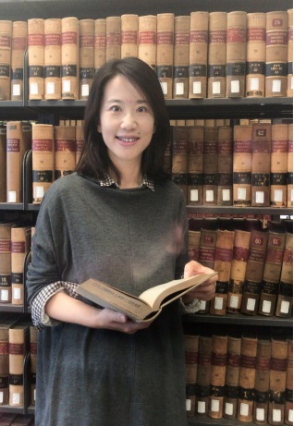
I. Basic Information
Hao Luyi is an associate research fellow at CASS Institute of International Law, an editor of Chinese Review of International Law, and a member of the Gender and Law Research Center of CASS Institute of Law. She has been a visiting scholar at Columbia University in the city of New York.
Hao Luyi has a B.A. from Shandong University, an LL.M from Nottingham University of UK and a Ph.D. in international law from East China University of Political Science and Law. She was also a Post-doctoral researcher at CASS Institute of Law.
II. Main Academic Viewpoints
Hao Luyi’s main research areas arepublic international law and international migration law. Her published works include: “Study on the EU Legal System of International Migration” (People’s Publishing House, 2011); “Study on the Legal System for the Protection of Women's Labor Rights in the EU” (China Social Sciences Press, 2013); “The Changed or Unchanged Issues of the International Refugee Legal System”(Northern Legal Science, 1 (2018)); “The Human Rights Approach to Global Migration Governance”(Journal of Shenzhen University(Humanities & Social Sciences), ); “Analysis of EU Immigration Law, Historical Evolution, Realistic Dilemma and Development Trend” (Global Law Review 2016); “Human Rights in Extradition” (Chinese Review of International Law 2015); and “The Protection of the Rights of Domestic Workers” (Hebei Law Science, 2014).
Hao Luyi has paid more attentions on the relationships between individuals and the states in the perspective of international public law, making an in-depth exploration on the theory and practice of human rights protection and national security involved in the field of immigration and refugees. Her academic views are as follows.
Her research is trying to explore the meaning and path of the global migration governance. The human rights approach to global migration governance is not to rebuild a new system of international human rights legal norms, but to integrate, on the basis of existing human rights normative frameworks, international human rights concepts and standards such as the principle of non-discrimination, empowerment and inclusion, oversight and accountability and so on. The integration of the human rights protection responsibilities and obligations of States, such as the original countries of migrants, transit and destination countries, provides practical guidance and concrete paths to guarantee the human rights and fundamental freedoms of all migrants.
Regarding to the area of refugees, her research emphasizes the importance of effective compliance with and effective implementation of the 1951 Refugees Convention and its Protocol at the international level in the context of the international refugee regime. Her research also proposed a global approach to international cooperation on refugee governance, centered on safeguarding the rights of refugees, addressing the root causes of refugees and effectively sharing responsibilities.
Her research also tracks the issue of immigration and refugees in the process of EU integration from an empirical point of view. The fundamental contradiction between the common governance of EU integration and the diversified demand of sovereign countries restricts the integrated structure and function of EU immigration law, which not only brings significant limitations to the decision-making and legislation in the field of external migration, but also sows the root cause of the realistic predicament and development hidden danger of the EU immigration legal system. In the long run, the issue of immigration has become a substantial "challenge" to the EU integration process in the EU, which has been internalized by the apparent "crisis", making it an important factor in determining the fate of the EU.



